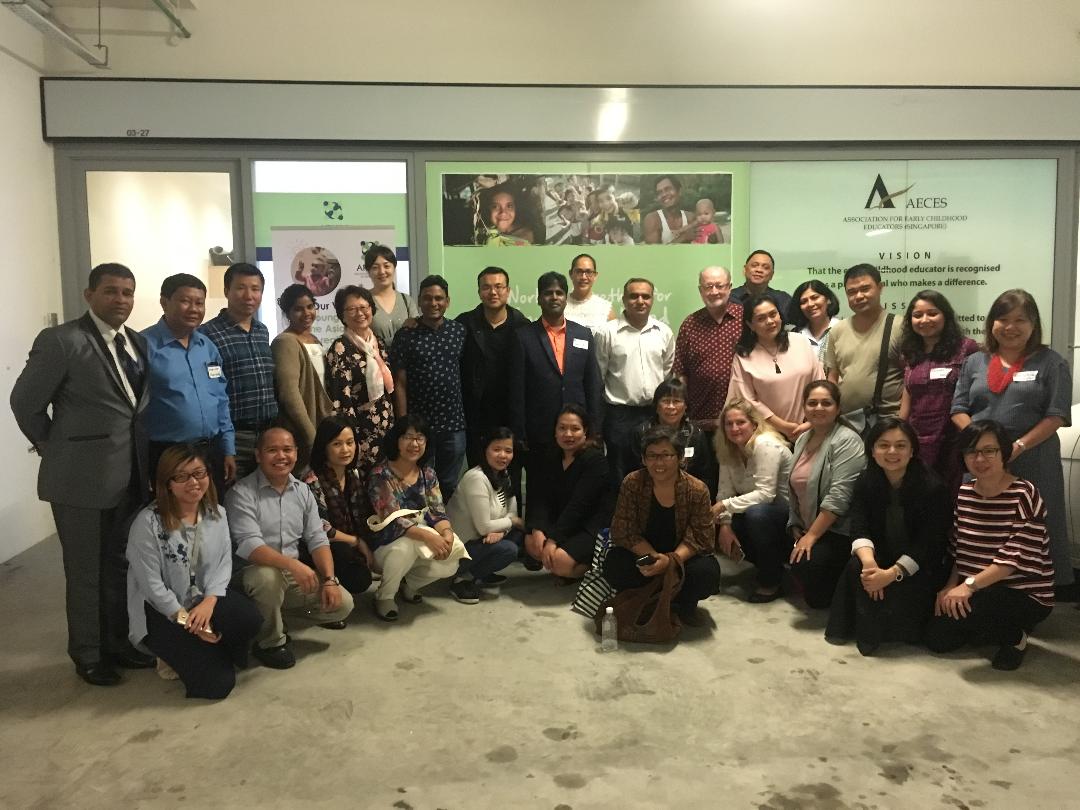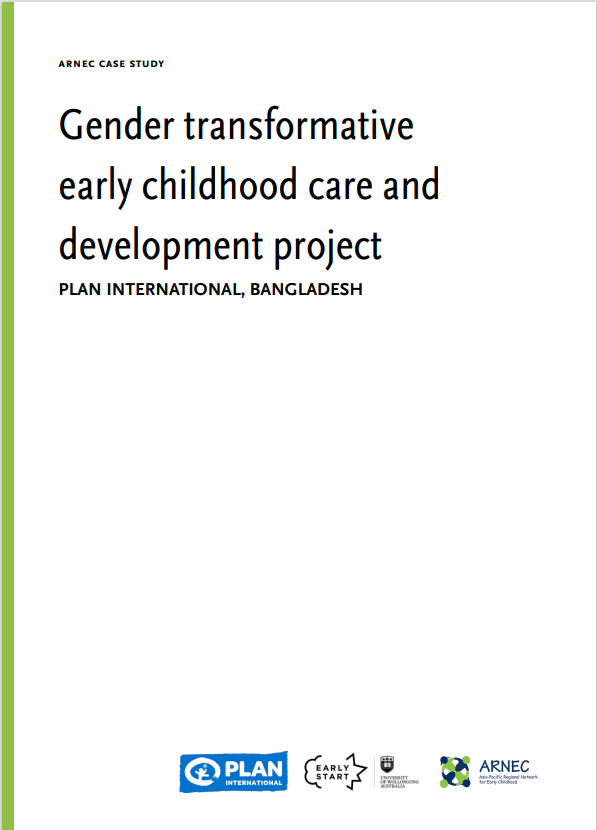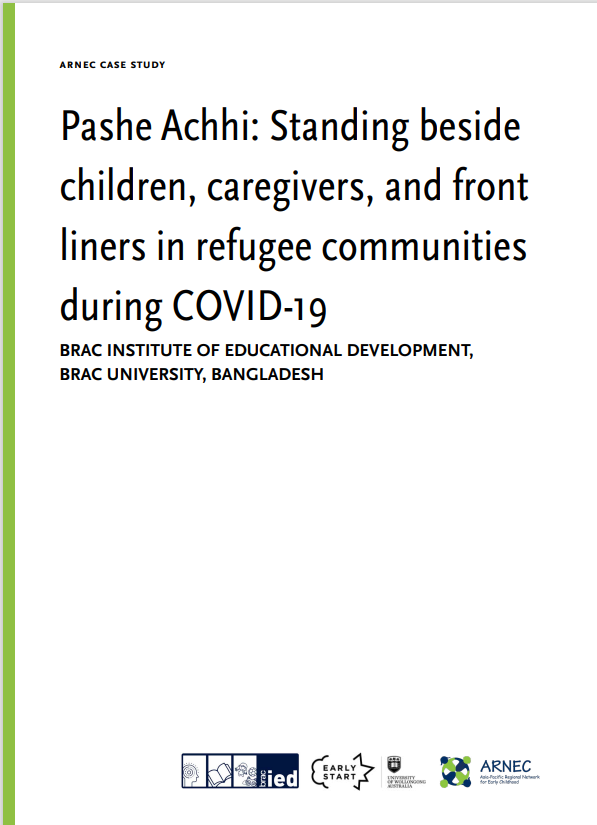Bangladesh

General information about ECCD in Bangladesh
Beginning in 1991, ECCD was referenced within policy documents including the National Plans of Action for Education for All (NPA-I and II). The Comprehensive Policy ECCD which was approved by the government in 2013 more prominently recognizes ECCD’s role in benefiting children’s development regardless of their backgrounds.
The term ECCD is generally used in Bangladesh to denote preprimary education for children between 3 and 5 years of age. The importance of school preparedness is demonstrated through the government’s integration of one-year pre-primary education for children age 5+ within the primary education system (specified in the National Education Policy 2010) and reiterated in the National Children Policy 2011. Preprimary providers include center-based school-readiness focused preschools and more play-based centered community- and home-based programs such as daycares and playgroups.
Similar to Nepal, Bangladesh has made steady and significant progress in reducing its rates of under-five and maternal mortality even though more investments in maternal and child health can result in greater progress.
Challenges
- Preschool education not currently prioritized to ensure school readiness especially for the most disadvantaged children.
- Lack of systematic planning to ensure provisions for children with special needs.
- Lack of investment in ECCD, especially in ensuring minimum quality of programs.
- Lack of comparable reliable and updated data on progress, gap and disparities between groups and regions with ECD indicators.
- A lack of Clarity on how to effectively implement an integrated, universal and transformative agenda and the increased diversity of actors involved in this implementation phase.
- Active participation of all stakeholders in the Strategic Framework for SDG4.2 and Action Plan for Bangladesh.
- Establishment of Children Directorate especially for Goal 4.2.
- Enuring monitoring and accountability of ECCD policy and program implementation.
- Limited awareness about importance of comprehensive ECCD among parents & other key stakeholders, including limited use of print/ electronic/social media for promotion of ECCD.Inadequate coordination/collaboration among various Govt, private and NGO service providers.
Priorities
- Provision for a year of free pre-primary schooling for all children age 5-6.
- Authorize and manage NGOs to establish preschools (‘baby class’) in government and registered non-government primary schools.
- Encourage establishment of community-based ECCE centers by NGOs.
- Blending holistic approach to education-focused ECCE programs to enhance holistic development of children.
- Establishing child care centre in government, autonomus and non-government organization including private intrepreneours (draft law).
Stay tuned as we'll be publishing the updated Country Profile soon.
Ministries in charge
Ministry of Women and Children Affairs. The Ministry of Primary and Mass Education leads on pre-primary education. Other key ministries involved in ECCD include the Ministry of Education, Ministry of Health and Family Welfare, Ministry of Social Welfare, Ministry of Religious Affairs, Ministry of Chittagong Hill Tracts Affairs and ICT Division.
Key Policies
- ECCD national policy approved in 2013.
- Comprehensive Early Childhood Care and Development Policy 2013 (in Bangla)
- Operational and implementation Plan of Comprehensive Policy 2016
- National Children Policy 2011
- National Plan of Action EFA (NPA-II) 2003-2015
- National Education Policy 2010
- Education Act 2016 (draft)
- Operational Framework for Pre-primary Education
National ECD Network
National Representative

Arnec National Representative For Bangladesh
University Of Rajshahi
Dr. Happy Kumar
Hkdasdu@gmail.com
Noteworthy Practices
1. Cascade model to serve hard-to-reach communities Implemented by Early Childhood Development Support Program-Bangladesh or ECDSP-B)
- Noteworthy aspects: Two-layered implementation structure comprise of a network or organizations to collaboratively replicate locally-developed ECCD models. Participatory model to maximize learning among organizations at all levels.
- Achievements: Hard-to-reach communities are served. Implementation capacity is enhanced through strengthening of a network of local NGOs.
2. Integrated ECCD for children and families (Implemented by Dhaka Ahsania Mission)
- Noteworthy aspects: Incorporation of holistic ECCD programming through partnership with multiple organizations.
- Achievements: Benefitting children and families in an impoverished region of Bangladesh
3. Improve children’s school readiness through parent education (Implemented by Bangladesh Shishu Academy or BSA)
- Noteworthy aspects: Regionally translated and adapted parenting education materials to improve children’s school readiness and retention in formal primary schooling. Materials reinforce the importance of parents and community involvement in early stimulation, care, and education.
- Achievements: Development of Parenting Education Guidebook and Facilitators’ Handbook for Parenting Education for utilization in community learning centers.
Latest Resources
Lorem ipsum dolor sit amet, consectetur adipiscing elit. Aliquam at porttitor sem. Aliquam erat volutpat. Donec placerat nisl magna, et faucibus arcu condimentum sed.

